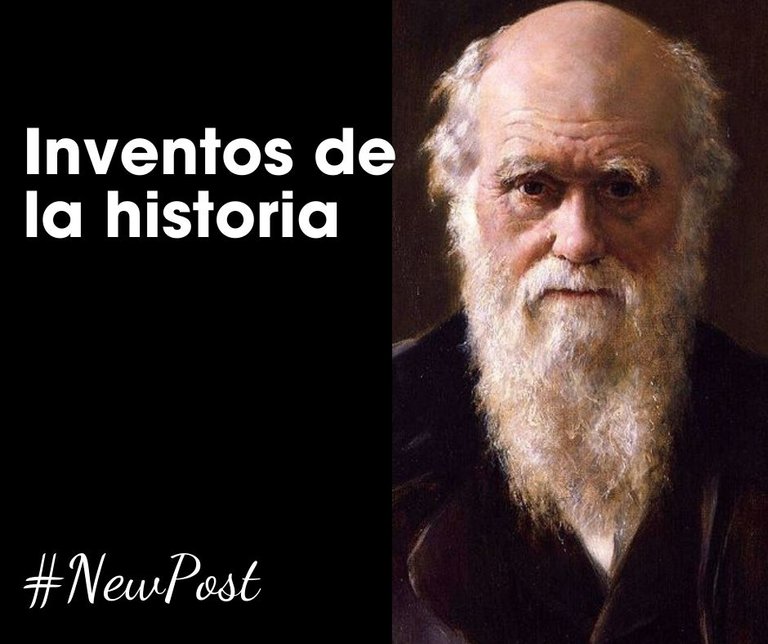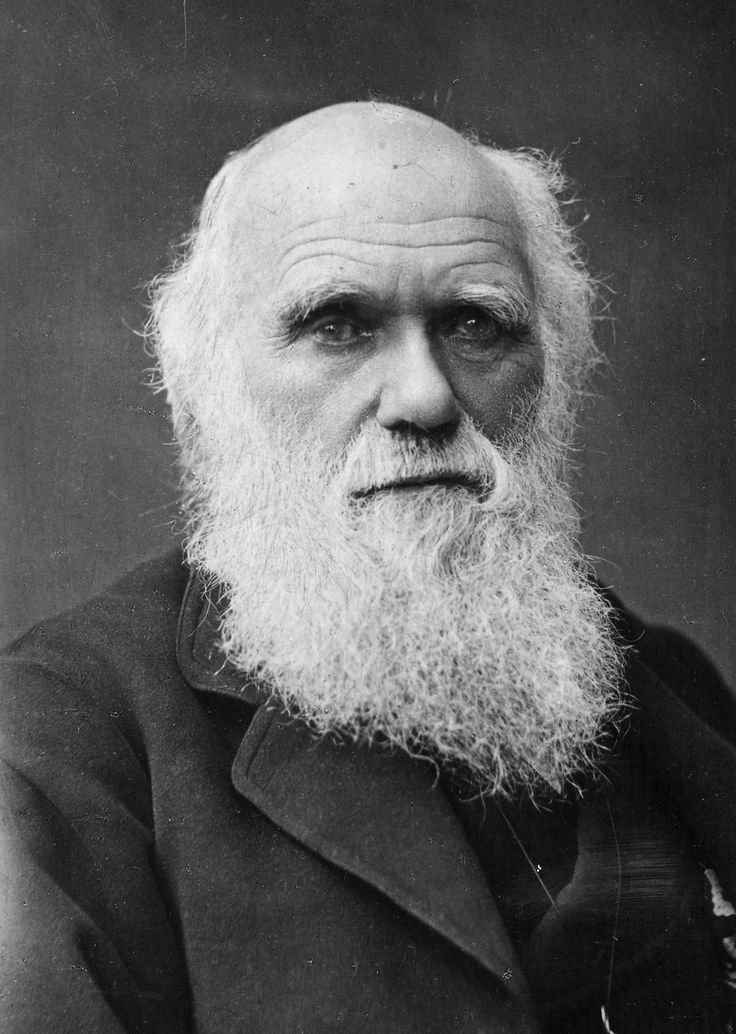[ENG-ESP] Inventions of history, Darwin || Inventos de la historia, Darwin

(Imagen creada por canva)

Hola como estan, estoy en otro
" Modo aleh ", con experiencias y sobre temas relacionados con ideas o reflexiones de mis investigaciones existencialistas.
La idea de crear, en épocas donde la tecnología no existía, solo una mente ingeniosa y curiosa, daria los mejores resultados, haré varios post sobre personas que hicieron un cambio al futuro de la humanidad, ciencia y tecnología. Podemos decir que fueron inventos qué otros terminaron de desarrollar o inspirarse.
Hoy hablaremos del biólogo Charles Darwin

Charles Robert Darwin
Nació el 12 de febrero de 1802, shrewsbury, Charles Darwin. Se especializo en la ciencia natural, fue famoso por su descubrimiento de la evolución biológica. Tuvo 5 hermanos, su padre fue Robert Darwin, fue médico, tuvo buena posición, casado con Susannah Wedgwood, fue nieto de Erasmus Darwin y Josiah Wedgwood por la parte de madre eran familias antiguas unitarias.
Su trabajo, fue más allá sobre la evolución y sus seres vivos. Fue a la universidad de edimburgo a los 16 años, hizo muchos estudios, pero sus estudios de medicina, fueron pospuesto las operaciones y sangre, lo traumaron, uniendose a la universidad de cambridge, estudiando ciencias naturales. Se volvió geologo, también investigó sobre la transmutacion de las especies y la cambio, su teoría 1838, se encontraba escribiendo teorías y un colega Alfred Russel Wallace en 1858 le envía las mismas, proponiendo una publicación. Su publicación y obra maestra " El origen de las especies por medios de las selección natural en 1859 ".
Unitaristas
Es una teología del cristianismo protestante, que se cree en dios y esta sostiene que Jesucristo no es el mismo dios.
Pensamiento de darwin :
No es el más fuerte de las especies el que sobrevive, tampoco es el más inteligente el que sobrevive. Es aquel que es más adaptable al cambio.
Charles Lyell
Fue geologo británico, nació el 14 de noviembre 1797 en Londres, fue miembro del uniformismo y el gradualismo geológico. Escribió principios de geología 1830.
Gradualismo
Doctrina, que habla de paso, de cambios que ocurren gradualmente.
Geología
Es la ciencia natural, que estudia la composición de la estructura interna como superficial del planeta tierra.
El diario de darwin
Luego de su expedición 1839, del HMS beagle zarpo plymouth el 27 de diciembre 1831, al mando Robert Fitzroy, este barco estuvieron calculando qué regresaría en 2 años, pero volvió el 2 de octubre 1836.
Conocido, este libro / diario, como investigación, reúne, memorias, detalles, anotaciones, científicas antropología, biología y geológica.
Biología
Esta ciencia, estudia la vida, orgánico, natural. Del griego Bio " vida " , lógica " Tratando ", estudio o ciencia.
Puntos de teoría :
a) El replicador evolutivo o mecanismo de transmisión
b) El principio de variación
c) El mecanismo de selección
Proyectos
Teoría de la evolución, reconoce las evidencias científicas, sobre la evaluación biológica. Luego realizo proyecto sobre semillas en agua plantas carnívoras.
- Recolectó 193 especies de plantas
- 26 aves terrestres
- 17 caracoles
- 15 peces marinos
- Reptiles
- Insectos
Variacion genética
Teoría de la evolución de Charles Darwin se basa en ma idea central de la selección natural, en la que las especies evoluciónan a lo largo del tiempo como resultado de la variación genética y de aquellos rasgos que contienen a los individuos ventajas adaptativas en un entorno específico. Darwin habla de las diferencias en los genes entre individuos, qué resultan en mutaciónes, cambios alteratorios qué se producen en el material genético, durante la réplicacion de ADN.
A través de la reproducción, las especies pueden transferir esos rasgos a generaciónes futuras, aportandoles más posibilidades a su descendencia de sobrevivir y de reproducir prosperamente.
Ancestros comunes
Todas las formas de vida comparten ancestro común, en cualquier parte de la historia evolutiva, todas las especies plantas, microorganismos, animales, comparten antepasados qué vivió en un pasado distante.

Hello how are you, I am in another
"Mode aleh ", with experiences and on topics related to ideas or reflections of my existentialist research.
The idea of creating, in times where technology did not exist, only an ingenious and curious mind, would give the best results, I will make several posts about people who made a change to the future of humanity, science and technology. We can say that they were inventions that others finished developing or inspired.
Today we will talk about the biologist Charles Darwin

Charles Robert Darwin
Born on February 12, 1802, Shrewsbury, Charles Darwin. He specialized in natural science, he was famous for his discovery of biological evolution. He had 5 brothers, his father was Robert Darwin, he was a doctor, he had a good position, married with Susannah Wedgwood, he was grandson of Erasmus Darwin and Josiah Wedgwood on his mother's side, they were old unitary families.
His work, went further on evolution and its living beings. He went to the University of Edinburgh at the age of 16, did many studies, but his medical studies were postponed, operations and blood traumatized him, joining the University of Cambridge, studying natural sciences. He became a geologist, he also investigated on the transmutation of species and changed it, his theory 1838, he was writing theories and a colleague Alfred Russel Wallace in 1858 sent him the same, proposing a publication. His publication and masterpiece "The Origin of Species by Means of Natural Selection in 1859".
Unitarianism
It is a theology of Protestant Christianity, which believes in God and maintains that Jesus Christ is not the same God.
Darwin's thought :
It is not the strongest of the species that survives, nor is it the most intelligent that survives. It is he who is most adaptable to change.
Charles Lyell
He was a British geologist, born November 14, 1797 in London, was a member of uniformitarianism and geological gradualism. He wrote Principles of Geology 1830.
Gradualism
Doctrine, which speaks of step, of changes occurring gradually.
Geology
It is the natural science, which studies the composition of the internal and superficial structure of the planet earth.
Darwin's diary
After his 1839 expedition, the HMS Beagle sailed from Plymouth on December 27, 1831, under the command of Robert Fitzroy, this ship was expected to return in 2 years, but returned on October 2, 1836.
Known, this book / diary, as research, brings together, memories, details, annotations, scientific anthropology, biology and geology.
Biology
This science, studies life, organic, natural. From the Greek Bio " life " , logic " Dealing ", study or science.
Points of theory :
a) The evolutionary replicator or transmission mechanism.
b) The principle of variation
c) The mechanism of selection
Projects
Theory of evolution, recognize scientific evidence, on biological evaluation. Then conducted project on seeds in water carnivorous plants.
- Collected 193 species of plants.
- 26 land birds
- 17 snails
- 15 marine fish
- Reptiles
- Insects
Genetic variation
Charles Darwin's theory of evolution is based on the central idea of natural selection, in which species evolve over time as a result of genetic variation and those traits that provide individuals with adaptive advantages in a specific environment. Darwin speaks of differences in genes between individuals, which result in mutations, alterational changes that occur in the genetic material, during DNA replication.
Through reproduction, species can transfer these traits to future generations, making it more likely that their offspring will survive and reproduce successfully.
Common ancestors
All life forms share a common ancestor, everywhere in evolutionary history, all species of plants, microorganisms, animals, share ancestors that lived in the distant past.


Si deseas dejarme un comentario sobre este tema, me gustaría leer
If you would like to leave me a comment on this topic, I would
like to read it
